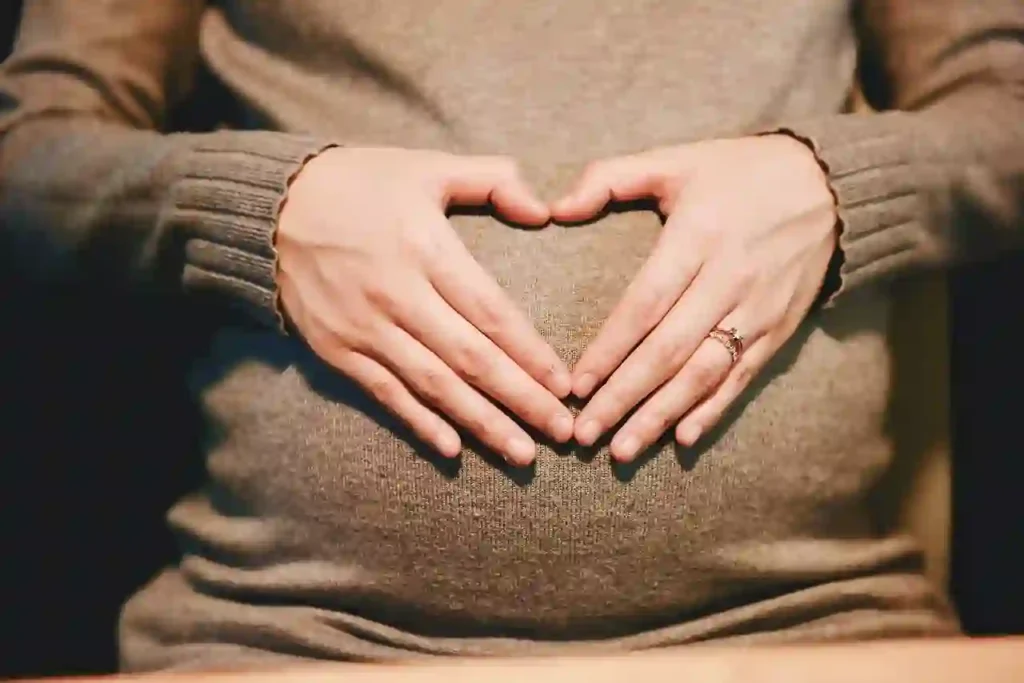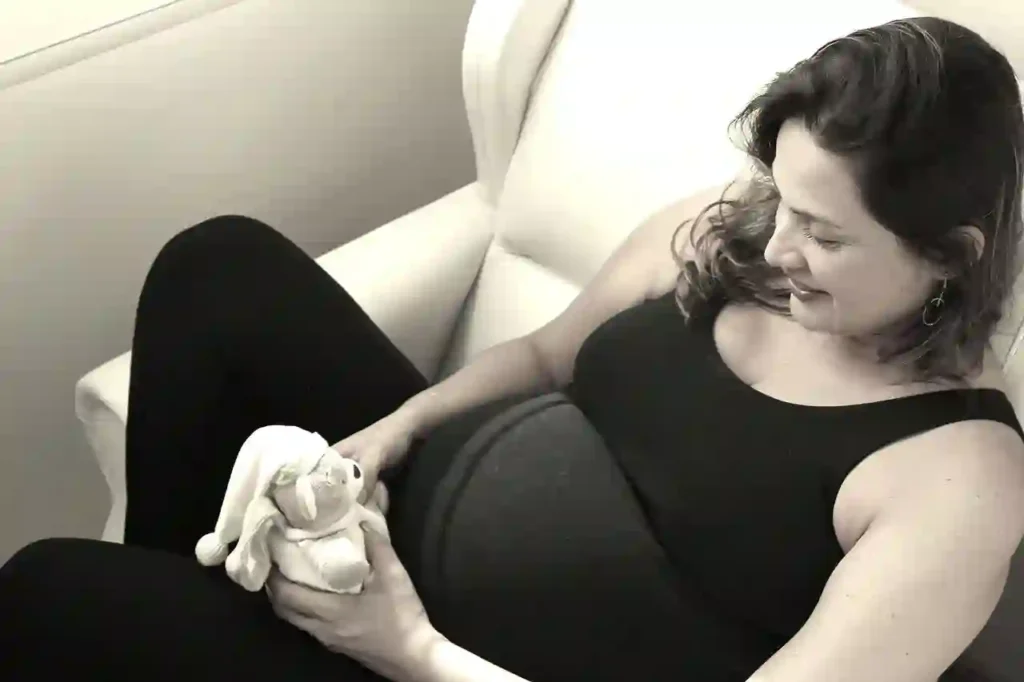Introduction

Pregnancy is a very sensitive period, physically and emotionally, and mental health is crucial to the outcome of a healthy pregnancy. The question many women ask is, Can Depression Cause Miscarriage in Early Pregnancy? Studies indicate that unmanaged depressions, combined with stress hormones and poor lifestyle choices can result in pregnancy complications. This awareness of the relationship between mental health, stress, and miscarriage can prepare expecting mothers to safeguard their health and deliver a healthy safe pregnancy process.
Table of Contents
What is Pregnancy?
Pregnancy is the natural state where a woman carries and grows an embryo or fetus within her uterus and it normally takes approximately 40 weeks between the last menstrual cycle and the birth of the child.
What is depression?
Depression is a widespread mental condition that is typified by persistent sadness, loss of interest or pleasure, sleep and appetite alterations, low energy and difficulties in daily functioning. It concerns emotional and physical health; its management is often necessitated by the need to treat it professionally, use therapy or lifestyle changes to control the symptoms.
What is miscarriage?
Miscarriage is the spontaneous termination of a pregnancy below 20th week. It may be caused by genetic disorders, hormonal disorders, maternal medical conditions, and lifestyle and often leads to emotional and physical problems. Simple health care and assistance in the initial stages assist in the treatment and healing.
Understanding Depression During Early Pregnancy
Many have not realized that depression in early pregnancy is more common than people think. Sad women, tired women, anxious women all ask themselves the question: Can Depression Cause Miscarriage in Early Pregnancy? Although it is not close to depression, the physical health can be affected by depression due to inadequate sleep, lack of appetite, or excessive stress. Such factors may indirectly affect the health of early pregnancy. Early identification and management of symptoms with lifestyle modification and expert care can assist in the minimization of possible pregnancy complications.
The Link Between Maternal Mental Health and Miscarriage
Mental health of the mother is also a key determinant when it comes to Can Depression Cause Miscarriage in Early Pregnancy. Having a poor emotional state can undermine the body to carry a healthy pregnancy. Depression can cause unhealthy behavioral patterns like unhealthy eating habits, smoking, or neglecting prenatal care. These practices may increase the risk of miscarriage. Developing effective emotional support frameworks, self-care and early medical assistance can go a long way in reducing the risk of complications at an early stage of pregnancy.
How Stress Hormones Affect Pregnancy Health
The question, can depression cause miscarriage in early pregnancy? has a huge role to play in stress hormones, especially cortisol. Hormonal balance may be disturbed by high levels of stress due to untreated depression. This disproportion can disrupt uterine activities, blood circulation and implantation of the embryos. The immune system can also be weakened by chronic stress and thus it becomes difficult to maintain early pregnancy. Stress management by use of relaxation methods, counseling and healthy living is aimed at safeguarding maternal well-being and well-being of the fetus.
Medical Studies on Depression and Miscarriage Risk

Some of the studies address the question of can depression cause miscarriage in early pregnancy. Although depression is not necessarily the direct cause, studies have shown that women who have severe depression are at the risk of early pregnancy loss. These risks are caused by factors like stress hormones, absence of medical attention and lifestyle practices. The medical practitioners focus on frequent prenatal visits and psychological assistance to protect the emotional stability of the mother and the growth of the baby.
The Role of Antidepressants in Pregnancy Outcomes
Antidepressants are another issue that can depression cause miscarriage in early pregnancy. There are drugs with a potential threat and those that are safe when used under a doctor’s supervision. Antidepressants and their withdrawal should not be stopped without any instructions as it may only exacerbate depression and thus negatively affect pregnancy health. The most risk-aversion strategy is to visit medical professionals that would prescribe medical regimens that would manage mental health and at the same time safeguard the unborn infant with respect to the risk of miscarriage during early pregnancy.
Emotional Well-being and Hormonal Balance in Early Pregnancy
It is emotional well-being that is critical in lessening health hazards during pregnancy. Can depression cause miscarriage in early pregnancy? Research indicates that untamed stress may upset hormonal balance, which affects the development of the fetus. The hormones are negatively impacting the uterus and placenta, such as cortisol, which is provoked by an excessive amount of sadness or anxiety. Emotional stability achieved by mindfulness, counseling, and relaxation practices assist to safeguard the health of pregnancy. To have a safe pregnancy experience, pregnant women must invest in the same mental state as much as they invest in physical health.
Lifestyle and Support Systems for Pregnant Women with Depression
The question, Can depression cause miscarriage in early pregnancy, lifestyle and support systems are very important. Healthy routines such as balanced nutrition, light exercise, and adequate rest support maternal and fetal well-being. Also, isolation is reduced with the help of emotional support of partners, family, or support groups and stress levels are lowered. Women who feel listened to and cared about have less complications. Miscarriage rate among the early pregnant can be greatly mitigated by establishing great social bonds and having a healthier lifestyle.
Preventive Measures to Reduce Miscarriage Risk
There is a question, Can depression cause miscarriage in early pregnancy? Precautionary action is effective. Therapy, meditation, and frequent check-ups will help to keep both the mother and the baby safe by managing stress. There is also reduced risk of miscarriage through avoiding alcohol, smoking and unhealthy diets. Women must be able to talk about depressive symptoms with health care providers to be addressed. One of the most effective forms of prevention against complications in early pregnancy is proactive care, along with emotional and physical well-being.
When to Seek Professional Help During Pregnancy

When asking a question, Can depression cause miscarriage in early pregnancy, it is important to understand when to take medical advice. The symptoms to watch out are continuous sadness, intense anxiety, decreased appetite or sleep disorders. The focus of mental health specialists on treating patients in the early stages of the disease will minimise the risks of complications and offer harmless treatment options. Physicians can prescribe treatment or closely followed drugs. Early assistance is a guarantee of maternal health, fetal development and a reduction in miscarriage risk, which is a relief during pregnancy.
Conclusion
Then Can depression cause miscarriage in early pregnancy? Depression in and of itself might not be a direct cause of miscarriage, but symptoms and stress that are not addressed can be dangerous. Emotional health, hormones, good lifestyle, and early medical assistance are significant in the prevention of pregnancy complications. A safe journey to pregnancy involves the allocation of mental and physical health to the expectant women. Risks can be reduced with the aid of support systems and professional advice, which will result in the healthier start of both the mother and the infant.
1. Can Depression Increase the Risk of Miscarriage in Early Pregnancy?
Depression can lead to a higher risk of miscarriage during early pregnancy because of the impact on stress hormones, quality of sleep, and health. There are several causes, though, and risks can be minimized by appropriate care.
Studies have indicated that early pregnancy depression may affect hormonal balance, stress levels and immune response which would contribute to slightly higher risk of miscarriage. Pregnancy health may be impacted by emotional strain and the absence of self care due to depression. But depression per se does not induce miscarriage directly, other medical, genetic, or lifestyle causes are also involved. Pregnant women can be treated through early diagnosis, supportive care and professional guidance and are likely to overcome the depression and minimize the concerns associated with miscarriages.
2. How Does Stress and Depression Affect Pregnancy Health?
Pregnancy stress and depression may elevate cortisol levels, sleep, and immunity, which may affect the growth of the fetus, maternal health and pregnancy outcomes when not managed appropriately.
Pregnancy stress and depression are chronic stressors; they have negative mental and physical health effects. Cortisol level may disrupt the balance of hormones, which subsequently causes fatigue, inappropriate nutrition, and compromised immune capabilities. This can be a factor in the complications such as preterm birth, growth retardation, or risk of miscarriage. These risks can be minimized through the prioritization of relaxation techniques, counseling and emotional support. A nurturing lifestyle can not only enhance the mental health of the mother, but can also guarantee healthier pregnancy outcomes between the mother and the baby.
3. Is There a Link Between Antidepressants and Miscarriage Risk?
According to some studies, some antidepressants have a little bit of adverse effect on miscarriage in early pregnancy, but left untreated depression can also impair the health of both the mother and the fetus, and this needs special medical attention.
The question of antidepressants and miscarriage is interdependent. There is a small possibility of such, but the risks of untreated depression are even greater, such as lack of self-care, stress. The physicians normally consider the dangers and prevalence, prescribing harmless options or modified dosage during pregnancy. Pregnant women must not make instant stops when taking medication, but should seek medical advice to reconcile the needs of mental health and safety of the pregnancy.
4. Can Hormonal Changes from Depression Trigger Miscarriage?
Depression has the potential to interfere with pregnancy hormones such as cortisol and progesterone that can influence the health of early pregnancies. However, miscarriage usually results from combined medical, genetic, and lifestyle factors.
Due to hormonal changes associated with depression, in particular, a higher level of cortisol and a lower level of progesterone, it may disrupt the implantation of the embryo and uterine well-being. Although this may increase the risk of miscarriage, it is not very often the only cause. Majority of miscarriages are caused because of the chromosomal abnormalities, maternal health problems or lifestyle factors. Hormones can be stabilized with the help of therapy, proper diet, and stress reduction methods. Professional medical care is safer and it lowers the emotional and physical health risk.
5. What Are the Emotional Impacts of Depression During Early Pregnancy?
Early pregnancy depression may lead to guilt, fear and hopelessness, which influence emotional comfort, attachment to the infant as well as the general experience of pregnancy.
Early pregnancy is a critical area of emotional health. Depression usually causes sadness, nervousness or detachment in a mother that may make her incapable of taking care of herself and her unborn baby. Such emotional conflicts can also cause the level of stress hormones, which indirectly impacts pregnancy health. Timely emotional support, counseling, and involvement of the family members help in increasing resilience. Mental health moderation will provide a healthier pregnancy and an emotional bond between mother and child.
6. How Can Depression Be Managed Safely During Pregnancy?
Pregnancy depression can be treated by using therapy, medications which are safe and are prescribed by the doctor, exercise, meditation, and support systems. Safe management reduces chances of miscarriage and improves health of the mother.
Treatment of depression during pregnancy is to be done safely to safeguard both the mother and the newborn baby. Physicians can prescribe antidepressants that are safe, counseling, or cognitive-behavioral therapy. Activities such as yoga, meditation and walking are natural mood elevators, which are stress relieving. Mental health is also reinforced by providing emotional support to the person by the family and friends. With safe management strategy as a priority, expectant women can reduce the risks associated with miscarriage and contribute to better development of the fetus during the early stages of the pregnancy.
7. Does Untreated Depression Affect Fetal Development in the First Trimester?
Yep, the untreated progression of depression during the first trimester may influence fetal development by elevating stress hormones and reducing immunity as well as exposing the fetus to a higher risk of miscarriage, that may impair the development of the child in the long-term.
The early onset of depression is associated with poor development of the fetus since it is not treated. The baby may be exposed to stress hormones such as cortisol causing a slow growth, preterm pregnancy or miscarriage. Research indicates that untreated depression has the potential to affect the baby brain growth and future emotional health. The importance of consulting a doctor in time is paramount to limiting complications. Correct treatment can promote a healthy pregnancy and reduce the chance of miscarriage related to untreated depression during the first trimester.
8. Can Lifestyle and Support Reduce Miscarriage Risk Linked to Depression?
Yes, depression as a cause of miscarriages can be minimized by leading a healthy lifestyle and possessing good emotional back-ups. Eating, physical activity, sleep, and counseling are very crucial in pregnancy health.
Being depressed during pregnancy, a woman is able to reduce the risks of miscarriege by changing the lifestyle and finding emotional support. A healthy diet and physical activity with light exercises and proper sleep improve health. Family, friend support or support groups minimize the sense of isolation and stress. Professional assistance coupled with good lifestyle practices can enhance mood, builds body, and lowers the chances of miscarriage in early pregnancy.
9. Should Pregnant Women with Depression Seek Medical Help Immediately?
Yes, depressed pregnant women need to get medical assistance right now. Early intervention will help to avoid serious complications, safer treatment choices, and reduce the risk of miscarriage in the first trimesters of pregnancy.
Sadness, hopelessness, or excessive fatigue are some symptoms of depression that should not be overlooked by pregnant women. Early diagnosis and safe pregnancy-specific treatment are guaranteed by immediate medical aid. The physicians can prescribe medication, precautionary treatment, or a change of lifestyle in order to secure the mother and a child. Prompt treatment minimizes exposure to miscarriage and helps establish a healthy fetus. Early intervention gives emotional stability, avoids complications and gives you a smoother pregnancy process despite the problems of depression.
10. What Precautions Can Help Prevent Miscarriage in Women with Depression?
In order to stay safe, precaution measures are to undergo regular checkups during pregnancy, practice stress management, adhere to medical instructions, eat well, work out, and avoid using harmful substances. These measures minimise the risk of miscarriage among depressed women.
Pregnant women with depression need to make great precautions in order to minimize the chances of miscarriage. Regular prenatal checkups are used to monitor the wellbeing of the fetus and to combat complications at an early stage. Stress management through yoga, relaxation techniques, and therapy strengthens emotional balance. Good nutrition, a non-smoking lifestyle, and light physical exercise help maintain the maternal and fetal well-being. As a result of medical advice, depression is safely managed and risks of miscarriage in early pregnancy are reduced.